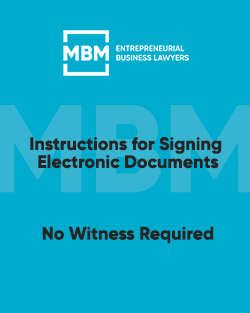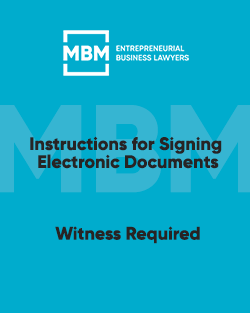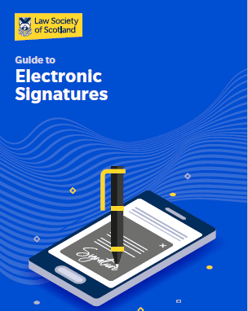FAQs
An electronic signature is defined as data in electronic form which is attached to or logically associated with other data in electronic form and which is used by the signatory to sign. This simply means that some electronic data has been used by a person to sign or otherwise signify agreement or consent. Electronic signatures can take a number of different forms.
For English and Scots law, the three main types of electronic signature are discussed below.
In the US, an electronic signature can be an electronic sound, symbol or process that is attached to or logically associated with a contract or record and executed or adopted with the intent to sign the record. There is one form of signature - standard.
For more information on what is classified as an electronic signature in English law and, Scots law and under US law, please see the relevant pages.
If you print out a document, sign it in wet ink and scan it, the scanned copy is not an electronic signature. This is an electronic copy of a paper (or “traditional”) document.
For English and Scots law governed documents, there are three types as follows:
- Standard or Simple Electronic Signatures – the most basic form of signature which can be used for most documents although a more robust signature is likely to be desirable for in many cases. Examples of simple electronic signatures are:
o signing for a parcel on a touch screen
o clicking “I agree” or “Submit” or ticking “I accept the terms and conditions”
o typing your name into an email
o electronically pasting a signature into an electronic version or a contract; or
o a basic signature on an e-signing platform. - Advanced electronic signatures – more secure than standard e-signatures, as they are uniquely linked to the signatory and capable of identifying the signatory, usually created through an e-signing platform
- Qualified Electronic Signatures – the highest standard of e-signature. Under Scots law, this will be self-proving for all documents. These are limited but MBM Commercial can provide and can be used for executing deeds.
For US law governed documents, only a standard signature type is used. There are no conditions for e-signature types – an electronic signature may be almost anything produced by electronic means (e.g. a symbol) that has been created to demonstrate a party’s intent to sign an electronic record.
The federal law, commonly referred to as the E-SIGN Act, provides that if a law requires a record to be in writing, an electronic record satisfies the law, and if a law requires a signature, an electronic signature satisfies the law. (See more information below under “Are electronic signatures legally
binding?”)
Please click here to our separate section of our Digital Deals Hub which highlights which type of electronic signature that we suggest you use on what document as part of working on a commercial digital deal. Our UK ‘house policy’ has been developed as part of completing a large number of corporate deals with digital signatures with a variety of law firms across the UK in recent weeks whilst being mindful of the legal position in both Scotland and England and the practicalities of using different types of electronic signature. Our US ‘house policy’ is based on our experience of doing deals in the US and the applicable law.
Scots law documents do not need a witness and in fact Scots law does not recognise the concept of witnessing an e-signature in the same way as a “wet ink signature”. Instead, the level of security and status of a signature will be dependent on the type of electronic signature used. For more information on Scots law documents and their specific requirements, please see our Scottish Law e- Signatures page.
The vast majority of English law agreements also do not need a witness and can be signed in this way. The Law Commission for England and Wales made this clear in its recent communications. Some English law agreements must be signed as deeds, meaning the contracting parties must sign the agreements in the presence of a witness who can attest to their signature in order to be legally enforceable. Our e-signature platform, Docusign, has the capability for documents to be signed and witnessed and we will use this for the signing of English law deeds. For more information on English law documents and their specific requirements, please see our English Law e-Signatures page.
Generally, witnesses to signatures are not needed for US law governed commercial documents.
In the UK, electronic signatures should not be used for:
- wills and registrable dispositions in Scotland, England and Wales;
- English deeds where a witness is not available (this will also be a problem for “wet ink signatures”; and
- Transfers of land.
As in the UK, in the US, under the applicable law for electronic signatures, UETA and E-SIGN, electronic signatures are not permitted or are limited for certain types of documents:
- Wills, codicils, and testamentary trusts;
- Contracts or documents governed by the Uniform Commercial Code (“UCC”);
- Negotiable instruments and some types of instruments of title;
- Certain certificated investment securities;
- Certain types of powers of attorney;
- Certain real estate transfer documents and other real estate agreements;
- Documents relating to adoption, divorce and other family law matters;
- Court orders, notices, and other court documents like pleadings and motions;
- Certain legal notices, such as default, acceleration, repossession, foreclosure, or eviction under a credit agreement secured by an individual's primary residence; cancellation or termination of either health or life insurance or benefits; and product recall notices affecting health or safety;
- Certain Federal and State forms and other government documents may be subject to separate additional signing requirements such as notarization.
E-SIGN also sets out certain requirements for financial institutions to follow in dealing with
consumers such as to obtain affirmative consent to the use of electronic records, and provide clear guidance, information and document retention policy.
Yes, both the Law Society of Scotland and the Law Society of England and Wales have confirmed that they are legally binding. They must be validly executed for certain documents but even non-validly executed documents have been deemed legally binding based on the behaviour of the parties.
The relevant law for electronic signatures in the US is principally found in two pieces of legislation, one with State based application, the Uniform Electronic Transactions Act (UETA), and the other applicable Federally, the Electronic Signatures in Global and National Commerce Act (E-SIGN). Both
enactments provide that a signature, contract or other record may not be denied legal effect,
validity, or enforceability solely because it is in electronic form or an electronic signature or record was used in the contract's formation.
There are three outlier states - New York, Illinois and Washington. These have independently developed laws (which pre-date UETA), but all three have amended or interpreted them to be generally consistent with UETA in their effect.
No. The Law Society of Scotland and the Law Society of England and Wales have both confirmed that one or more parties may use an electronic signature, while the other party/parties sign in wet-ink.
Similarly in the US, there is no requirement for all parties to use an electronic signature.
Note that in certain US consumer contracts, the consumer must affirmatively consent to using an
electronic method of signature.
Holding documents as undelivered could be achieved either by:
- using functionality available on the e-signing platform
The e-signing platform we use, Docusign, can be configured so that, after the last signature, there is another step required (the "approval" step) before the document is confirmed as complete. That final step could be to require MBM to add the agreed effective date. The parties could agree in advance that MBM would only add that date when all parties had agreed that they could do so. Docusign would record and certify that the final approval step had been taken. This would enable the parties to control the date on which the electronic document comes into effect. There would need to be a supporting email exchange which made clear how this would work so that everyone knew and agreed what this final approval step signified.
- having an email exchange between the parties
The parties/their solicitors could agree by email exchange that, notwithstanding the last date of signature, and whatever messages the e-signing platform sends out, the document will not come into effect until all the parties agree. There would then need to be a further email exchange confirming that date. In either scenario, the email chain would need to be stored with the electronic document.
Our default policy will be for MBM to date the document after all parties have signed. If parties would prefer that we do not do this, then we can use the email exchange method.
Some e-signing platforms now provide a higher degree of certainty as to how a document was executed in comparison to using pen and paper to produce “wet ink” signatures and scanning these.
For example, documents signed using DocuSign are, when returned to the sender, accompanied by a ‘summary’ which includes time stamps for when the signatory opened the e-mail enclosing the document for signing and when the signatory executed the document. The ‘summary’ document also includes a unique IP number confirming from which IP address the document was electronically executed.
pre-empt any inconsistent state law unless that state has adopted the UETA without amendment. E-SIGN allows states some authority to “modify, limit or supersede” provisions of E-SIGN if the law is consistent with the substance of E-SIGN. However, this could be a matter of opinion, and one court may decide the state law is consistent with E-SIGN while another court may disagree. E-SIGN will also apply to matters of interstate commerce (which most commercial contracts will fall under). Of course, this is also an area of contention between state and federal courts. Which law applies is an evolving area of law which might vary from state to state and be dependent on the circumstances..




